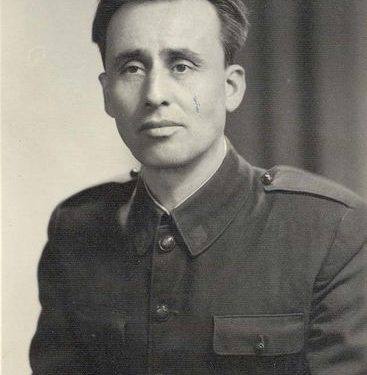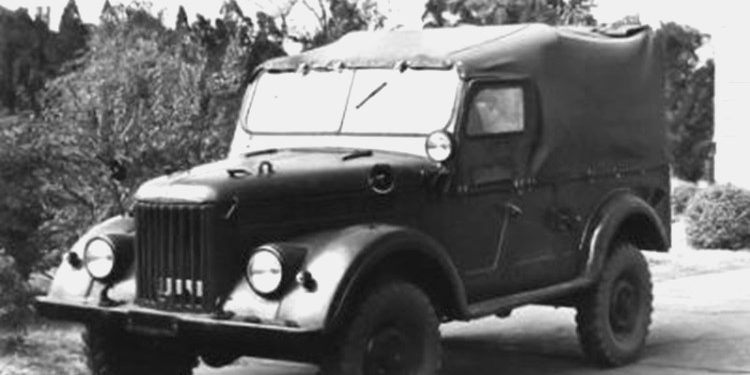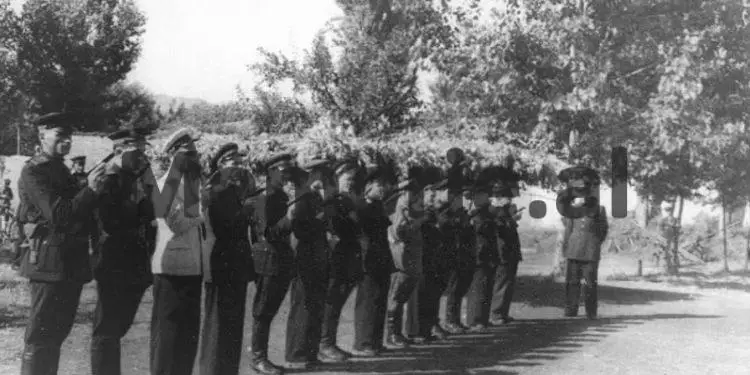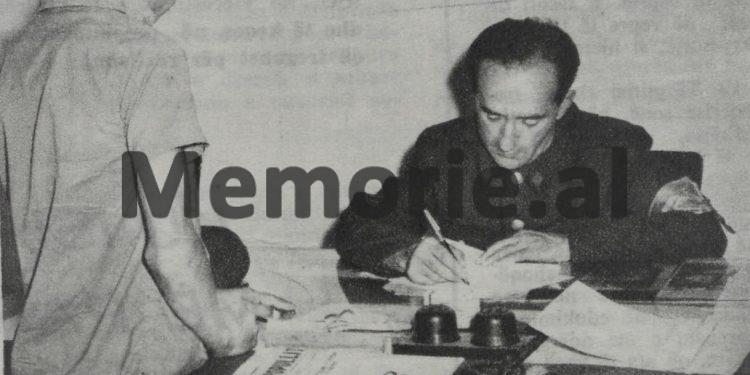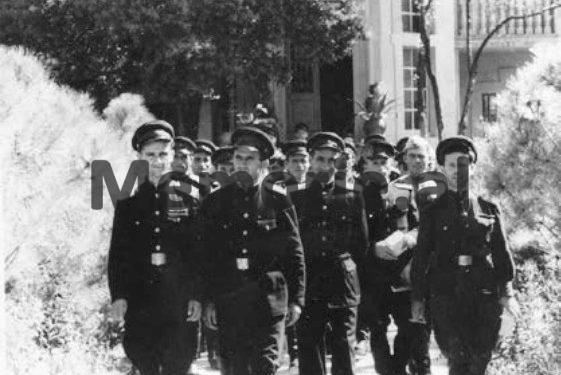By Uran Kalakulla
Part Nine
Nazism and communism
Memorie.al / Nazism lasted 12 years, while Stalinism lasted twice as long. In addition to many common characteristics, there are many differences between them. The hypocrisy and demagogy of Stalinism was of a more subtle nature, which was not based on a program that was openly barbaric, like Hitler’s, but on a socialist, progressive, scientific and popular ideology, in the eyes of the workers; an ideology that was like a convenient and comfortable curtain to lie to the working class, to lull the sharpness of intellectuals and rivals in the struggle for power.
One of the consequences of this peculiarity of Stalinism is that the entire Soviet people, its best, most capable, hardworking and honest representatives, suffered the most terrible blow. At least 10-15 million Soviets lost their lives in the torture chambers of the KGB, martyred or executed, as well as in the camps of the Gulag and others like them, camps where it was forbidden to correspond (in fact they were prototypes of the Nazi death camps); in the mines in the ice of Norilsk and Vorkuta, where people died from cold, from hunger, from crushing work in countless construction sites, in the exploitation of forests, in the opening of canals and during transportation in lead-lined wagons, or in the flooded barns of the death ships.
Continued from the previous issue
Apparently, Metoja got along well with Commander Yzedini, because I heard that they often teased each other about the superiority of their province. Thus, the Skrapar-Labëri duel began: we were the bravest, we have the best brandy, the best inns, dairy, meat, hospitality, and so on. Since, necessarily, peasants and mountaineers, as they were in essence, I did not expect them to talk about Immanuel Kant, since, even if they had finished the seventh grade, its program did not contain this philosopher.
Metoja, however, had a habit: when we were in need, he would stand opposite (since the door had to be always open), and would not leave you at all comfortable, to perform that miserable need. I could not imagine how he did not feel like vomiting and how he could eat bread afterwards. Was this his specialty?! It seems that’s why he didn’t eat at all, because he was fed up with the smell of our common garbage, of the entire chain of dungeons. Even there, he would tease you to get out as soon as possible: – “Hey, get up now, you’ve done thirteen things wrong; I’ll hit you on the head thirteen times with my clogs, so you’ll have to jump thirteen meters up!”
Of course, more than an incitement or a threat, this was one of his usual jokes. This time not about bravery, but about the apotheosis of the haleja, so much so that he came up with a nickname: not “Meto Labi”, but “Meto Haleja” or, more precisely, “Meto Muti”! Although he was weak, Metoja, if they gave the order to the investigator, would melt into a lump and take his soul. Could you be gentle and kind in that kind of place?! Were they not chosen, for such work, by the Department’s own “specialists”, that is, by the chief butchers?
Another capter, that comes to mind, was a certain “rhinoceros” with the surname Troplini. At least from the surname, he must have been from some village in the Durrës or Kruja district. He was a short, chubby man, with a bald head and a nose like a cucumber, one of those autumn cucumbers where green mixes with yellow. But, in Troplini, that nose, which seemed to me like a snout, between his plump cheeks, seemed to have shades of blue and red. Thus, I concluded that this Troplini was a hardened alcoholic.
But, the lowest, was Karafili. He was also a thin, sallow man, with a thin, long nose, pressed to the side and with a sharp tip, which gave his face the appearance of a fox or a jackal. He had two dark eyes, with a bad, ominous light, whose gaze never promised a good thought. He was the prototype of the spy because, apparently, nature had designed him with that physique and face, precisely for such a dirty job.
Throughout his shift, whenever he was on duty, day or night, he would come and go, all the time, in the corridors and eavesdrop on what was being said or done inside the dungeons, especially when there were more than two of us there. He wanted to know everything, see everything, hear everything. And, when he felt like it, he would open the door and shout at us, threatening to take our souls away.
I had noticed that his fellow officers did not like him. I had caught words in which his comrades expressed irony and contempt towards him at times. For example, Commander Yzedini, almost never looked at him. Apparently, he would have reported him there too, in the offices on the second floor of the building next to the dungeons. I had noticed that Karafil, however, behaved with disgusting servility, but he did not even look at him and, when the spy spoke to him, immediately turned his head away, as if he had not heard him at all. A worthy friend of his, but much more cynical and crueller, was no longer a policeman, but an officer with the rank of first captain, whose name was Muharrem Vasjari.
He often came to our dungeons, opened the window and, when you complained to him about something, as the case may be, did not answer you at all. He looked at you with those wolfish eyes of his and smiled with a beastly malice and irony, and when you were in trouble, his eyes shone with malice. He had a red face, as if in copper, but, always, with the same green tint of poisonous rust. I do not know exactly what task he was performing. Maybe he was the chief investigator of the Branch, maybe the executioner who took the condemned to torture, shooting or hanging.
Because it seemed clear that his greatest pleasure was, precisely, carrying out this kind of work. Of all the personnel of the Branch of that city or district, like that of Durrës (personnel that, of course, I did not have the “pleasure” to know all of them), I say that the ideal friend of this Muharremi could have been the head of the Internal Branch himself, Kopi Niku, and, why not, also his first assistant, the then deputy head, Kapllan Sako, about whom, years later, I heard that he had also become the head of the investigation of the Directorate of Security.
In the dungeons of Durrës, they neither beat me nor tortured me!
I do not want to add untrue things. Because, first of all, I was wise and more careful. In speech and in other matters, I tried to be careful in every way. But I have heard that some others were beaten and tortured so badly that their screams would make your flesh turn black. Even though they didn’t beat and torture me, should I call that damn dungeon, a place of comfort, of pleasure?!
Meeting with the “Gorilla” and his boss
Meanwhile, the investigation had entered its own hole. Now not one, but more than one of us arrested, had opened our mouths. I never found out who had been the first, because, when I was in the Koci dungeons (as they were called), in Tirana, the investigator at the time, Major Llambi Titani, did not let me see the investigative file. I only touched it with my hands and signed it, because I wanted to finish that damn job, which had brought me to the end of my nose, as soon as possible and go, now to court. Let it come out, wherever it comes out.
In Durrës, after the first two sessions (the one with the head of the Tirana branch, Jonuz Mersini and the Durrës branch, Kopi Niko, as well as the one the next day with Kapllan Sako and the military prosecutor with the surname Skënderi), I was called by a certain other investigator, named Sotir Xega. Now, alone. Although a civilian, he, as he told me, held the rank of first captain. He was a living ruin, both in body and face. He had a withered, thin, and wrinkled face, like a pickled pepper. A few washed-out eyes, an expression on his face that was incapable of showing either cruelty or, at least, malice.
And when he spoke, it seemed that he stuttered more. In fact, often, along with half-sentences, drool would come out of his mouth. So, he was a disgusting creature. Even his handwriting was as it was. Chicken feet, perhaps, had more beauty than his handwriting. It was obvious that he had just passed the illiteracy course, since ignorance came out like black pitch, from the pores of his pale skin and all the wrinkles on his face. Hell, his voice was like a growl: something between a growl and the sound of a cat sharpening its claws.
Sotir took him seriously. I never saw him get angry or scold or curse. Let alone shoot him, of course. Perhaps the latter did not happen, because physically I was eating him to bits. And I was not a big guy at all, on the contrary. But he was even worse than me. Where the hell had they gotten him, an investigator like that?!
Because of my superiority, why not also physically, it was me who sometimes got angry. And then Sotir would back down, soften or become more lenient and would agree to write only what I told him, which, in reality, was not a deposition at all, but a gibberish that made no sense and, more than that, sounded like a mockery of the investigative process itself. The investigation with Sotir, as if it insulted me, because it seemed to me that they had not hung up on me at all and had called me the last hole of the horse. I don’t know if the others had the same investigator Sotir, like me.
But, thinking further, of course it was very good for me that they had not “been pleased” me, because it was convenient for me. This, in Albanian, for me, meant: they still did not know anything about the Tirana Group and that we were there (me and Tanushi), only as the tails of Pjetri and Zeqiri. And, indeed, if this work had continued to the end, I would have been punished less than everyone else; Tanushi a little more than me, and the greatest punishment would have been given to Pjetri and Zeqiri, for drafting and getting hold of the damned “program”.
Ah, if it had continued like this! All of us, that is, the four of us who were arrested first, would have had it much easier, that three of the friends of the Tirana group, perhaps, would have escaped without getting wet at all. With Sotir Xega, as an investigator, we, the arrested, would have had it much easier.
But, alas, that did not happen, because one day, when I was called to the investigator, I found myself in front of a new face. This was a young man, stout, with a healthy red face, blond and wavy. They called him Koço Kostandin, which to me meant: Koço to the second power, because isn’t “Koço” an abbreviation of the full name Kostandin? So, in short: either Kostandin Kostandin, or Koço Koçoja.
This Koço Koçoja introduced himself to me as an investigator for the State Security Directorate. So, he came from Tirana. This meant to me that something very bad had happened, that the work was not going well at all and that the Durrës Internal Affairs Branch, with Sotir Xega and his friends, had already washed their hands of us and that they had handed us over to more trained butchers or head butchers, although, in the end, all the butchers of the Security were the same, as long as they took the souls and lives of people.
This giant, with red hair and face, as soon as I was brought before him, after the first words, he began to tell me that the real investigation, the completely “professional” one, would begin now, with him. According to him, the ones I had had up until then were not lawyers, but only Operative Workers, therefore not at all skilled. So, he thought that this “quality change” would be understood as something good, favorable for me; as if I were dying for his “professionalism”! He didn’t think, the fool, that this way he would gain points with me and that I would empty his stomach.
For me, that kind of “professionalism”, even if it were true, would be a somewhat sharper machete, a scalpel that would seek to penetrate, even to the thinnest tissues of my being. In fact, as I found out, this Koço Koçoja was nothing more than a swindler, like all the others I had had up to that time. Great wonder! I went through ten investigators, who I don’t know why they changed me.
And each of them spoke badly, with contempt, about his predecessor and, indeed, about all the others. Was this some kind of tactic of theirs to gain the trust of the defendants? Maybe! But I think that, in this midst, there was a great truth, which gave me to understand clearly that they, among themselves, did not love and did not respect each other at all.
In a word, this was for me a sign that the decay, the spiritual and moral degeneration of the fortress that, outwardly, seemed something very solid, indestructible, immortal, had begun. Before I went to prison, I had concluded that the only organ of power and the red party, which seemed the most perfect and worked like clockwork, was the State Security. But, direct contact with it, from the first hours of the arrest, made me understand that this was not true at all.
Most of the people from the Security Service, whom I had the fortune to encounter, sometimes directly and sometimes indirectly (because I had no way to avoid them), during the twenty-one years of prison that I spent, were stupid, ignorant. They had only one thing in common: they were murderers, cruel, treacherous and captors, to the point of disgust and hatred. Some of them could even be cunning, but that was it. And it is known that cunning is never equal to intelligence.
The interrogation sessions with Koço Kostandini did not last long and, one day, sitting at the table, I was confronted with another face. As if Koço’s “professionalism” had not been enough and now a higher “professional”, with a “scientific rank”, had arrived from the Security Service?! In fact, this new face had the rank of lieutenant colonel, although he always came in civilian clothes.
His name was Irakli Kocani. He was from the South Coast, but I don’t know from which village! From the way he spoke, he seemed like a minority. He was a glutton like an Egyptian, but with a big body, like a bear’s or, better yet, a gorilla’s. His face, swollen with disgusting fat, here and there, between black pores (like those of mechanics who get under cars and get all oil and grease), created a disgusting snort, like that of a northerner’s phlegm. He also had a thick voice, exactly like a gorilla’s growl.
Thus, the “professionalism” of this subject, consisted (as I later proved), only in the insults, the screams and the physical violence. I found trouble with him. Until then, to be precise, I had not been beaten and tortured. With this “gorilla”, this work also began. In front of him, I looked like a child. With one punch, he could have knocked me unconscious to the ground. But, thank God, the matter did not reach this point, because, perhaps, I could have remained in his hands. They did not want this either, not because they felt sorry for us, but because they wanted to put us on trial, to break us and make us accept what they liked.
He often took me to the interrogator, after midnight. The prison guards and those in charge, opened the door and I did not notice at all, because I was in a deep sleep. They would shake me with their boots to get me up and, dragging me like a wolf over a sheep, they would pick me up almost half naked and carry me upstairs, in front of the black-faced man’s table, who would stare at me for a while without speaking, like a wolf, and then, when I, who had barely collected myself, would not accept what he was saying, he would roar at me, rush at me, hit me on the head with his fists, or with a board he was holding on the table, almost breaking my skull.
I, as much as I could, avoided him, to somehow soften the blow or to make it go unnoticed. Thus, this duel, which lasted for I don’t know how long, ended with threats and the vilest insults. By now, Mihallaq Ziçishti’s first insult had been forgotten. Before the insults of this “gorilla”, they had been “compliments”! And when I would speak back to him, the “gorilla” would get furious, grab me by the throat, almost take my breath away, and throw me to the ground.
It was clear: in terms of vocabulary, he had attended the “Brakka Academy” in Tirana. Having suffered like this many times, I lost my mind and found a way for that dog to prevent him from approaching me. Because, when physical strength is not enough, cunning is the only weapon left. So, as they led me in front of him, I would start coughing, just like people with advanced tuberculosis do. Once, he saw me from afar and asked me:
– “Why are you coughing like a dog when there is a bone stuck in its throat”?
– “I have tuberculosis and I have started vomiting blood”. I gave it back, you bastard!
Of course, I did not notice in that beast even the slightest feeling of pity, because, after all, I did not expect such a thing. But, in that disgusting face, I clearly noticed the obvious signs of fear, of course, not for me, but for himself, fear of infecting him with my “disease”. And, thus, this trick saved me from his physical approach, but unwanted in all directions. (Isn’t it a great pleasure to have a “gorilla” of the jungle, or a wild bear of the forest, approach you! Let them smell bad, but their claws and teeth do not promise anything good.) So, so it is with this savage of an investigator. Memorie.al





